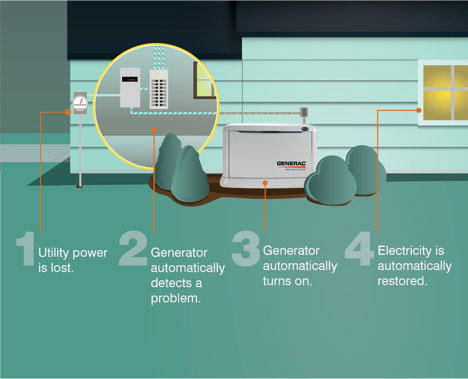10% off generators for Military, Veterans, Seniors, First Responders, and Educators
Generators are primarily used for converting mechanical energy from the generators engine into electrical energy. They are also used in locations where there is a lack of electrical power or simply for a back up in case power were to turn off. Because generators have an engine to run, they function on a variety of fuel sources. The two most common sources of fuel come from liquid propane and natural gas.
Generators come in a variety of sizes and forms. By hiring your professional electrician for proper installation and product over view, you can find out which generator will be best suited for your home’s needs. Contact your H&H specialist today for additional information.
Liquid Propane
When propane is in temperatures that are below -45 degrees or under extreme pressure, it turns into its liquid formation. When the liquid propane reaches its temperature height of -44 degrees, it then turns into a vapor. Because liquid propane is extremely cold, it can not only be dangerous to handle, but also hazardous if you are not aware of proper installation methods. Since propane is odorless, tasteless, and colorless, it makes it hard for the average home owner to distinguish it without the proper tools. Leaving proper installation to your professional Atlanta electrician can help reduce the risk of accidental misuse- leading to frostbite and additional injuries.
Storage tanks houses the liquid propane because it has the ability to keep is under pressure, until the propane leaves the tank. Once the propane leaves the tank, it then transforms into a vapor as it hits areas under normal temperatures. It is vital that your home’s storage tank is positioned upright to help keep the liquid regulated for it to properly leave the tank when needed.
The most common uses for liquid propane in homes is heaters and cooking devices that need the vapor form of propane to function.
Natural Gas
Natural gas is found deep within the Earth’s crust in the form of pressurized deposits. Because natural gas is highly combustible, it makes for a highly valued resource when couple with low emissions. Natural gas is primarily used for heating homes, cooking, water heaters, dryers, and many other appliances that require it to run. Because natural gas is highly combustible, it is vital that you work with your professional electrician for proper installation methods.
Most homes use either liquid propane or natural gas to run their appliances. Because of this, we offer both forms depending on your generator and the needs of your home. We also provide a variety of generator brands upon request and our H&H specialists also assist in the installation process. Contact us today to learn more about your options!







